Part 1 of the series can be found here
Part 2 of the series can be found here
Part 3 of the series can be found here
Part 4 of the series can be found here
Part 5 of the series can be found here
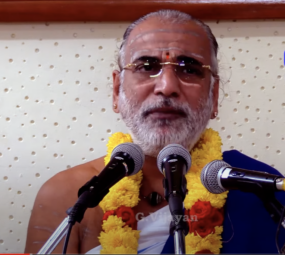
Only if a person has Vyasa’s Prasada (blessings) can they tell the Mahabharata story.
Namo Bhagavathe Tasmai Vyasayaa Amita Tejase
Yasya Prasadaat Vakshyaami Narayana Kathaam Imaam
Sanjaya Visits Yudhishtira as Dhrtharasthra’s Messenger
Sanjaya is dear to Yudhishtira and a Krishna Bhaktha, he is the most appropriate candidate to go as a messenger to visit Yudhishtira. Sanjaya rides the chariot himself and arrives at Yudhishtira’s place. Yudhishtira warmly greets Sanjaya and performs Kushala Prashna – asks about the welfare of all of the Kauravas – Bhishma, Drona, Kripa, Dhrtharashtra, Duryodhana and everyone else. Then asks about the purpose of Sanjaya’s visit.
Sanjaya says that Dhrtharasthra does not want war – and has belief in the goodness of Pandavas – and how Yudhishtira is Satva Guna Pradana (is predominantly filled with goodness). If Yudhishtira wants to fight, it would be like a black dot on a white cloth. By contrast, a black dot on a dirty cloth will go unnoticed.
Yudhshitra: “Sanjaya, I haven’t said a word. When did I talk about fighting? And why are you afraid of fighting?
Peace is greater than fights
Yudhishtira extols the merits of peace.
War brings with it a lot of loss. We notice today how countries that are at war with each other face an economic loss.
There shouldn’t be fights at home.
There shouldn’t be fights between neighbours.
There shouldn’t be fights between one street and another.
There shouldn’t be fights between cities.
There shouldn’t be fights between states.
There shouldn’t be fights between countries.
However, should a fight arise, a warrior shouldn’t shy away. And a true warrior will not give up what is rightfully theirs. The Kauravas enjoyed what is not rightfully theirs for 13 years. If they give the rightful share back, there will be no necessity for a battle, concluded Yudhishtira.
Sanjaya responds
Sanjaya makes further cases for Yudhishtira to give up their share of the kingdom
- If they don’t get the kingdom, can the Pandavas live in the world or not? They can, can’t they? For instance, they can beg for a living.
- We live in this earth for a short lifespan. Do the Pandavas want to spend some of that time engaging in a fight? Shouldn’t they spending their time doing good acts?
- When someone is angry, they should drink their anger. “Drink your anger Yudhishtira”, appeals Sanjaya.
- “Do you really want to fight Bhishma, Drona et al and win your kingdom back? Can you really live happily Yudhishtira?”, asks Sanjaya.
- Sanjaya asks Yudhishtira to reframe the situation. Instead of Duryodhana et al usurping the kingdom, can’t Yudhistira view the situation as the Pandavas willingly giving up the kingdom to the Kauravas? Surely there won’t be a problem then?
- “You can win over Bhishma. Can you win over old age? Can you win over death?”, Sanjaya asks hard-hitting questions.
Yudhishtira makes his decision
Sanjaya’s arguments have the flavour that appeal to Yudhishtira’s nature. Bhishma, Arjuna, Nakula, Sahadeva, Draupadi, Krishna have their eyes on Yudhishtira. Will he give in to Sanjaya’s request?
No.
Yudhishtira makes some beautiful points:
- Educated people must avoid group think and must think for themselves.
- In some places, acting according to dharma can be adharma.
- When the situation calls for anger, if you don’t show anger, that will not be appropriate. E.g a teacher, husband, father, should all show anger on appropriate occasions.
- If I keep quiet now, it goes against Kshatriya Dharma.
Yudhishtira therefore tells Sanjaya he can’t accept his request.
Krishna Supports Yudhishtira
Krishna agrees with Yudhishtira’s stance. “I’m impartial to the Pandavas as well as the Kauravas”, He explains His stance. “However, given the circumstances, and the request, how can there be a samadhana (resolution)?”, He asks.
Krishna compares Duryodhana’s unjust stance as akin to stealing. Even if the Pandavas die in the war, it is not adharma, Krishna declares. Krishna lists all the injustice meted by the Kauravas, from the unfair gambling, to Dushasana’s insult to Draupadi, let alone Karna’s harsh words in the court.
“I will come to Hasthinapura to mediate with Duryodhana”, Krishna offers.
Krishna makes a further statement: If Duryodhana doesn’t feel like parting with half a kingdom, the Pandavas will be open to receiving a smaller share.
Now, some may have a doubt. Krishna claims that the Pandavas and the Kauravas are dear to him. Isn’t it unfair to the Pandavas to offer a smaller settlement? Krishna, of course, knows the future – how Duryodhana will refuse to part with land as small as the size of the needle – so this is a Mott point.
Sanjaya Reports Back to Dhrtarashtra
Sanjaya returned to Hasthinapura by nightfall. Dhrtarashtra was waiting for Sanjaya eagerly to know what transpired. Sanjaya reported back saying “All Yudhishtira cares is about Dharma. He doesn’t want wealth or any other personal gain. Just Dharma. Just as a snake sheds its skin on the Amavasya day, Yudhishtira’s virtue makes him shed his papas (sins) regularly.
Oh king, I think you are building enmity with Yudhistra with your stance. Yudhishtira asked me to give his reply in the Sabha. In any case, I am tired after the long trip. I will rest tonight and will report Yudhishtira’s message tomorrow at court. Good night, king!”
Koota Neeti
In the Adi Parva, Dhrtharashtra learned the art of deception – Koota Neeti – from Ganika, who was the priest of Shakuni. “I’m jealous of the Pandavas. What should I do to not lose the kingdom?”, he asks Ganika, who gives him a set of instructions. Dhrtharasthra absorbed these instructions completely, hence when Vidura gave him Vidura Neeti, he couldn’t abide by it; his earlier learning superseded Vidura’s instructions.
Here are the tenets of the Koota Neeti:
- He should highlight his skills and achievements, to a point of boasting.
- He should hide his own faults.
- He should highlight the faults of others.
- He should dish out harsh punishments.
- He should hide his plans like a tortoise hides its shell.
- Like how we remove a poisoned thorn completely off the foot, he should completely crush his enemies.
- He should be blind to certain actions of people.
- He should be deaf to certain actions of people.
- He should be wolflike – hide from behind when attacking enemies.
- He should find the root weakness of a person, and attack that root, to finish off the person
- He should be glib to the enemy who is stronger than him. Once he gains strength, then he should mercilessly crush the said enemy.
- His only goal should be to crush his enemy. By doing whatever it takes.
- If the enemy is a coward, intimidate them and crush them.
- If the enemy is a great warrior, pretend to bow to them and then crush them.
- Once you consider them as an enemy, forget your relationship with them – be it your brother, father, son, relative, teacher, it doesn’t matter.
- If your enemy is alone at their home, set fire to their house.
- Drive enemies away from the city.
- When the enemy still has trust in you, crush him. Once the enemy suspects you, the game is up.
Dhrtharashtra Cannot Sleep: Vidura Neeti Introduction
Dhrtharashtra cannot go to sleep. He summons Vidura to his chambers.
Dhrtharashtra performed a random act of kindness by summoning Vidura. The world got a true gem in the form of Vidura Neeti. Dhrtharasthra tells Vidura he can’t go to sleep. Vidura spends the entire night instructing the king on various tenets of justice, which should form the basis of a person’s life.
Vidura starts by listing the various people who cannot go to sleep:
- Those who have enmity with people stronger than them
- Those who have lost their property
- Those who are lovestruck.
- A thief.
- One who desires other’s properties.
Qualities of an Intelligent Person
- He knows what he cannot achieve and does not pursue that he cannot achieve in vain.
- He doesn’t dwell over losses.
- He does not get perturbed when he faces danger.
- He does not overly rejoice when praised.
- He does not overly get sad when insulted.
- Just as how the water in the middle of Ganga is stable, he too is stable in life and does not get crushed.
- He is a skilled orator – he talks fluently without breaks and pauses.
- He supplies twists-and-turns and surprising facts to captivate his audience and readers.
- He is good at interpreting ambiguous situations.
- He grasps texts as well as their purports quickly.
Qualities of a Fool
- Without putting the effort to learn the appropriate skills, he is arrogant and proud.
- He is poor but is a spendthrift, and borrows money to pay for his profligacy.
- He is lazy, but wants a rich life nevertheless.
- He doesn’t do his own work, and instead interferes in the work of others.
- Betraying a dear friend who has trusted him with all heart.
- Falling in love with those who don’t love us. Desiring things that should not be desired.
(Vidura seemingly tells Dhtrharashtra – Pandavas love you but you don’t love them – Your sons don’t love you but you love them) - Not pursuing that which should be pursued.
- Fighting with a person who is stronger than him.
- One who does not do Shraddham and other Pitr Karyams for ancestors.
If we don’t supply offerings to our ancestors, then who will? Ask the scriptures. - One who doesn’t worship the Gods. In this context, commentary says one who doesn’t worship their Kula Deiva is a fool.
- One who doesn’t forge friendships with good people. A suhrt, a good person, performs good acts without expecting something back.
- Anahootah Pravishathi – One who enters uninvited.
The only place where a person should go uninvited is Satsanga. - Aprshto Bahubhashathe – He engages in loose talk when not spoken to
- Avishvasthe Vishvasathi – He trusts those who are not to be trusted
- He who teaches a person who hasn’t asked to be instructed. Who offers unsolicited instruction/advice.
- A person who refuses to teach a student who has asked to be instructed.
- A miser who refuses to spend even for himself.
Anahoothah Pravishathi Aprshto Bahubhaashathe
Avishvasthe Vishvasithi Moodachetah NaradhamahA person who enters a place uninvited, who engages in loose talk when not spoken to, who places trust in those who are not to be trusted, he is a fool.
One
Vidura engages in number play – he started telling Dhtharasthra wisdom pertaining to the number one, wisdom pertaining to the number two, all the way up to seven. He first starts with a sloka that enumerates qualities pertaining to the numbers 1,2,3,4,5,6,7. He then takes each number and deals with it extensively.
Sankara Rama Dishshitar encouraged the audience to not just listen to the lecture and go back and live life as before. Rather, he encouraged the audience to follow the advice in life, especially virtues such as patience.
- Don’t eat food, especially delicious and expensive food, alone.
A person who eats food alone will be born in his next birth as a rat.
Similar to food, there is a saying about wealth as well – don’t enjoy your wealth alone, share it.
- A person should not pursue the following endeavours alone:
– Progress (a team can accomplish more than an individual)
– Education (you want to enlist the help of right mentors and teachers)
– Marriage (you want to consult family for their thoughts) - Don’t go in a new road alone. (If some danger ensues, you won’t have anyone to help)
- When everyone else is sleeping, don’t be the only one awake. (In the context of this day and age, if you can’t go to sleep, don’t stare at your cell phone. Close your eyes and try to sleep)
- Ekam Eva Advitiyam Tat. Satyam.
Truth is the one which is non-dual.Satyam (Truth) is the step to the heavens. One shouldn’t deviate from Satyam.
- Ekah Khsamathaam Doshah
Patience brings with it only one side-effect. Others will think you’re a pushover 🙂
What can you not achieve with patience? In the previous discourse, we saw how Dhrthrashtra was afraid of Yudhsitira’s patience more than Arjuna’s skill or Bhima’s strength.
Anybody can choose to be patient. Elders can be patient. The young can be patient. Who can fight against a patient person?
With this point, Vidura hints to Dhrtharasthra that he has failed to respect Yudhishtira, who is patience personified.
The complete discourse (in Tamil) can be found here.
Picture credit: Yogesa, CC BY-SA 3.0, via Wikimedia Commons

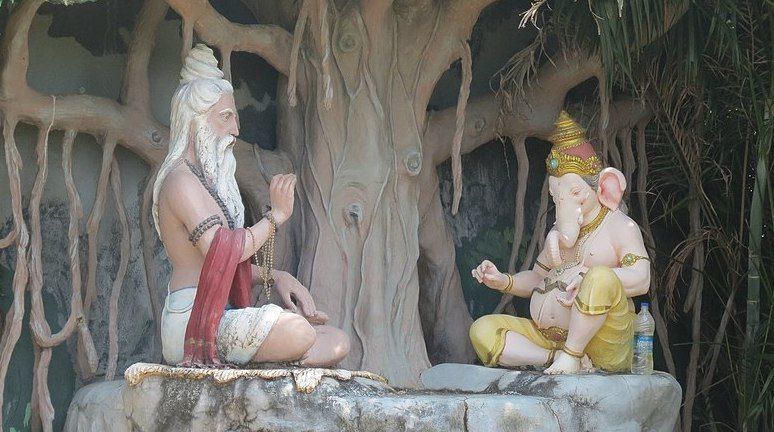

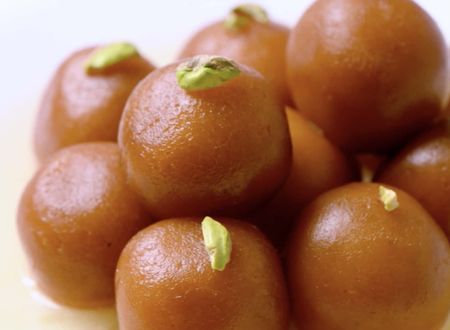
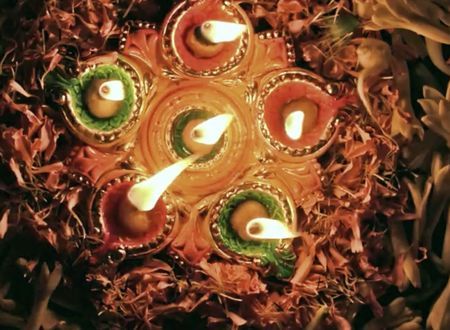
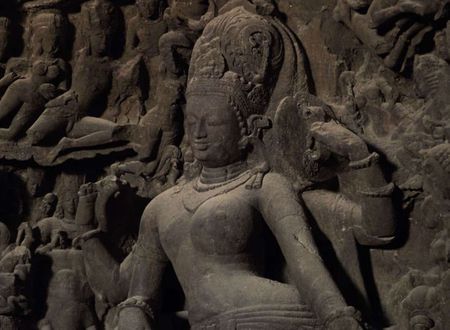



Comments & Discussion
6 COMMENTS
Please login to read members' comments and participate in the discussion.